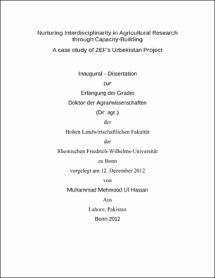Mehmood-Ul-Hassan, Muhammad: Nurturing Interdisciplinarity in Agricultural Research through Capacity-Building : A case study of ZEF’s Uzbekistan Project. - Bonn, 2013. - Dissertation, Rheinische Friedrich-Wilhelms-Universität Bonn.
Online-Ausgabe in bonndoc: https://nbn-resolving.org/urn:nbn:de:hbz:5n-31392
Online-Ausgabe in bonndoc: https://nbn-resolving.org/urn:nbn:de:hbz:5n-31392
@phdthesis{handle:20.500.11811/5533,
urn: https://nbn-resolving.org/urn:nbn:de:hbz:5n-31392,
author = {{Muhammad Mehmood-Ul-Hassan}},
title = {Nurturing Interdisciplinarity in Agricultural Research through Capacity-Building : A case study of ZEF’s Uzbekistan Project},
school = {Rheinische Friedrich-Wilhelms-Universität Bonn},
year = 2013,
month = mar,
note = {Interdisciplinary research is one of the key strategies of Center for Development Research (German: Zentrum für Entwicklungsforschung -ZEF) of Bonn University. ZEF claims to be one of the top centers of excellence in development research, which carry out applied research relevant to developing countries. Presented in this thesis is sociological data from its Uzbekistan Land and Water Restructuring project’s third phase (2007-2011), illustrating how such centers operationalize interdisciplinary research; how these design research projects, how these centers build capacity for interdisciplinary research, and then induce, implement and sustain interdisciplinarity in their research. The main question addressed in this dissertation is “to what extent and how the ZEF’s longitudinal model of facilitated, structured and incremental capacity building combined with problem based interdisciplinary action research shaped interdisciplinarity amongst its teams of collaborating scientific staff, and how sustainable this interdisciplinarity was”? The mixed method approach of this study differed substantially to the single method approaches, such as interview research or bibliometric analysis, so far used to study interdisciplinarity.
The study finds that the process of designing the research proposal and devising a contextually appropriate capacity building model and the model for conducting interdisciplinary research itself became a sociological process of negotiation amongst ZEF scientists discharged with the task of designing research proposal. The power imbalances inherent in ZEF’s departmentalized structure mirrored during the research design and implementation phases. The innovative capacity building model, which was tailored to build the capacity of ZEF’s staff was able to assist team members in overcoming their disciplinary epistemologies after some struggle. At the initial stages of the process, some of the research team members showed dual epistemologies: the fundamental and the superficial. The latter appeared to be more a socially desirable response to their team membership. The research process dynamics identified a number of challenges and barriers that could potentially disrupt and frustrate interdisciplinarity, but many of those challenges were gradually overcome by the teams themselves, or with assistance from project managers and the facilitator. The study finds that the conditionality that ZEF faces from its research donors and its parent university determine what kind of and how much of interdisciplinarity can be achieved at ZEF. As the main vehicles to undertake interdisciplinary research at ZEF are donor funded research projects, sustaining the capacity for interdisciplinary research will remain the key challenge for ZEF. Key implications for theory, methodology and practice of interdisciplinary research are also spelled out.},
url = {https://hdl.handle.net/20.500.11811/5533}
}
urn: https://nbn-resolving.org/urn:nbn:de:hbz:5n-31392,
author = {{Muhammad Mehmood-Ul-Hassan}},
title = {Nurturing Interdisciplinarity in Agricultural Research through Capacity-Building : A case study of ZEF’s Uzbekistan Project},
school = {Rheinische Friedrich-Wilhelms-Universität Bonn},
year = 2013,
month = mar,
note = {Interdisciplinary research is one of the key strategies of Center for Development Research (German: Zentrum für Entwicklungsforschung -ZEF) of Bonn University. ZEF claims to be one of the top centers of excellence in development research, which carry out applied research relevant to developing countries. Presented in this thesis is sociological data from its Uzbekistan Land and Water Restructuring project’s third phase (2007-2011), illustrating how such centers operationalize interdisciplinary research; how these design research projects, how these centers build capacity for interdisciplinary research, and then induce, implement and sustain interdisciplinarity in their research. The main question addressed in this dissertation is “to what extent and how the ZEF’s longitudinal model of facilitated, structured and incremental capacity building combined with problem based interdisciplinary action research shaped interdisciplinarity amongst its teams of collaborating scientific staff, and how sustainable this interdisciplinarity was”? The mixed method approach of this study differed substantially to the single method approaches, such as interview research or bibliometric analysis, so far used to study interdisciplinarity.
The study finds that the process of designing the research proposal and devising a contextually appropriate capacity building model and the model for conducting interdisciplinary research itself became a sociological process of negotiation amongst ZEF scientists discharged with the task of designing research proposal. The power imbalances inherent in ZEF’s departmentalized structure mirrored during the research design and implementation phases. The innovative capacity building model, which was tailored to build the capacity of ZEF’s staff was able to assist team members in overcoming their disciplinary epistemologies after some struggle. At the initial stages of the process, some of the research team members showed dual epistemologies: the fundamental and the superficial. The latter appeared to be more a socially desirable response to their team membership. The research process dynamics identified a number of challenges and barriers that could potentially disrupt and frustrate interdisciplinarity, but many of those challenges were gradually overcome by the teams themselves, or with assistance from project managers and the facilitator. The study finds that the conditionality that ZEF faces from its research donors and its parent university determine what kind of and how much of interdisciplinarity can be achieved at ZEF. As the main vehicles to undertake interdisciplinary research at ZEF are donor funded research projects, sustaining the capacity for interdisciplinary research will remain the key challenge for ZEF. Key implications for theory, methodology and practice of interdisciplinary research are also spelled out.},
url = {https://hdl.handle.net/20.500.11811/5533}
}






